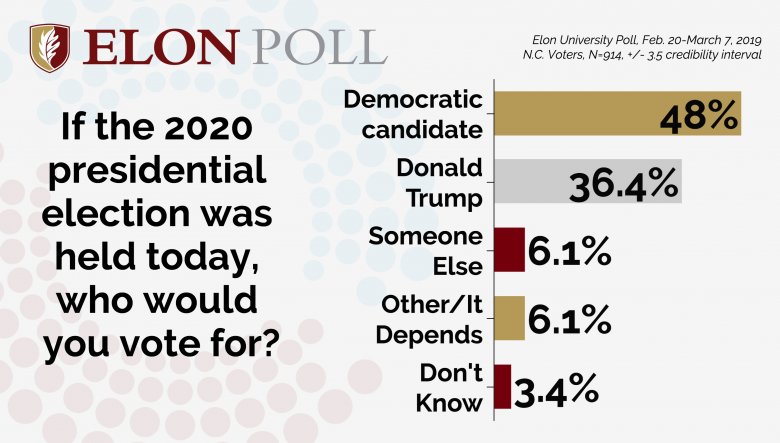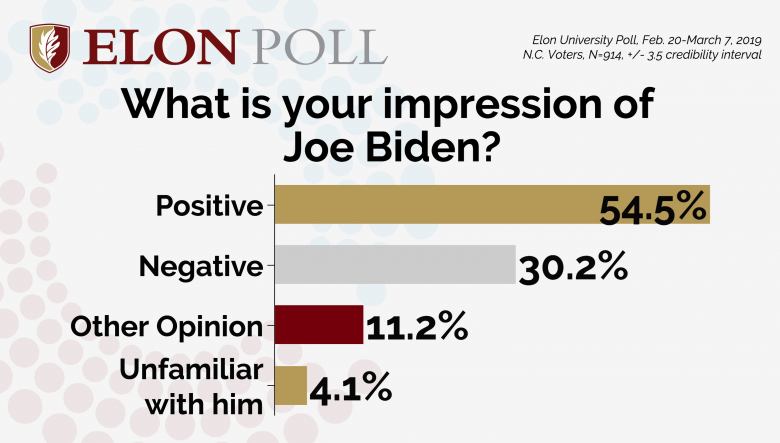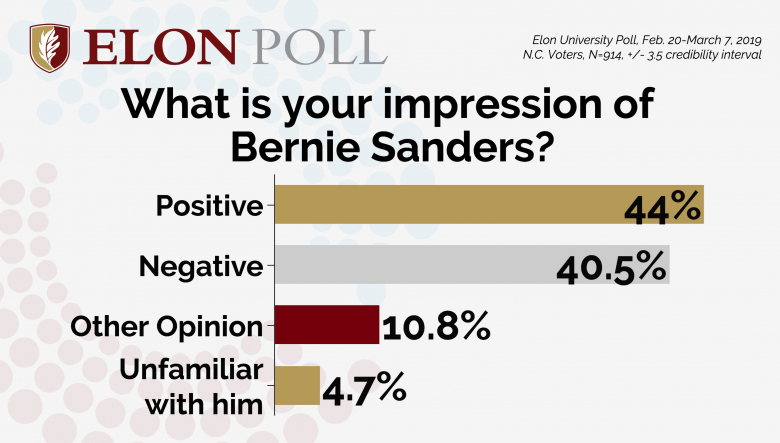The survey also found that if the election was held now, the Democratic presidential nominee has a better shot at winning North Carolina than President Donald Trump.
The field of Democratic and independent contenders for the presidency is becoming increasingly crowded as voters look ahead to the first presidential primary next year. At the same time, North Carolina is poised to retain its status as a battleground state, with Charlotte preparing to host the Republican National Convention in August 2020.
With that in mind, the Elon University Poll surveyed N.C. voters to gauge their impressions of 12 men and women who have already launched a bid for the Democratic nomination or are expected to do so in the near future.
The poll, conducted between Feb. 20 and March 7, found that former Vice President Joe Biden and U.S. Sen. Bernie Sanders of Vermont, who made a strong bid for the nomination in 2016, are the most recognizable among the group, with 55 percent of voters having a positive impression of Biden and 44 percent of voters having a positive impression of Sanders. Many speculate that Biden could soon announce a plan to run.
When asked whether they would vote for President Donald Trump or the Democratic nominee if the election was held today, 48 percent said they would vote for the Democrat while 36 percent say they will back the president, a Republican. Asked who they think is likely to win the election, 43 percent said the Democratic candidate will win while 36 percent said Trump will prevail.

"Consistent with many others polls, we find President Trump maintains strong loyalty among registered Republicans in North Carolina,” said Jason Husser, poll director and associate professor of political science at Elon University. However, unaffiliated voters are currently breaking toward a hypothetical Democratic candidate by a margin that could portend serious trouble for the president's 2020 coalition. That said, I expect many of those voters will change their minds as the Democratic nominee moves from hypothetical to actual; the extent of this change will largely shape what we see in North Carolina over the next 20 months."
The survey was a mixed mode, blended sample design. Of the 914 respondents in the weighted sample, 423 were interviewed on the telephone or email from a random sample of N.C. voters from the public voter file list and 491 were interviewed online through an opt-in survey sample marketplace. The survey had a credibility interval of +/- 3.5 percent. Different from the margin of error, the credibility interval is used to measure the accuracy of nonprobability surveys such as the opt-in online portion of this survey. A fuller explanation of the credibility interval and the survey methodology are available in the full report.
Voters like them, Voters like them not
Voters were given the names of presidential contenders and asked if they were familiar with the person, and if they were, they were asked whether they had a positive, negative, or some other impression of the candidate.
Only 4 percent of voters were unfamiliar with Biden, with 55 percent saying they had a positive impression of Biden, who represented Delaware in the U.S. Senate for decades before serving as vice president from 2009 until 2017. Thirty percent of voters have a negative impression of Biden, and 11 percent have some other opinion.
Biden enjoys the highest “net favorability” — the percentage of voters who view him positively minus the percentage of voters who view him negatively — with that gap measuring more than 20 percentage points. He’s the only person in this list with a net favorability greater than 4 percentage points.

Biden had higher favorability ratings among voters who were younger, female, urban or minorities, all voter groups that were also more inclined to look favorably upon Sanders. Looking at party affiliation, 77 percent of Democrats have a positive view of Biden compared to 58 percent of independent voters and 24 percent of Republican voters.
Sanders, whose support swelled nationwide in 2016 as he challenged frontrunner Hillary Clinton for the Democratic nomination, was similarly well-known, with only 5 percent unfamiliar with the long-time Senator. But though 44 percent of voters hold a positive view of Sanders, 41 percent also have a negative view of him, with another 11 percent having some other opinion. His net favorability gap of a little more than 3 percentage points was the second-largest among those included in this survey, demonstrating the challenges that he and others in the field face in trying to boost favorability, reduce negative perceptions or both.
"North Carolina's Democratic Primary is still almost one-year away, but, as of today, Joe Biden and Bernie Sanders have major advantages in both recognition and favorability over the rest of the increasingly crowded field. Biden's numbers are better, by far, than any other candidate in our poll. However, I expect those gaps will narrow as voters learn more about other candidates."

Thursday marked the much anticipated entry into the race of former U.S. Rep. Beto O’Rourke, who raised his national profile last year during a close contest with U.S. Sen. Ted Cruz in Texas. But despite growing familiarity with O’Rourke on a national level, many in North Carolina remain in the dark about him, with 53 percent of voters saying they are unfamiliar with him. He fares slightly better among Democratic voters in the state, with 47 percent saying they are unfamiliar with him, 33 percent saying they have a positive opinion about him and 7 percent saying they have a negative opinion
Among those perhaps facing the steepest hill to climb in North Carolina in terms of recognition is U.S. Rep. Tulsi Gabbard of Hawaii, who has served in the U.S. House since she was elected in 2012 as the first Samoan American and Hindu member of Congress. The survey found that 78 percent of N.C. voters were unfamiliar with Gabbard. U.S. Sen. Amy Klobuchar, who recently gained publicity during the confirmation hearings of U.S. Supreme Court Justice Brett Kavanaugh, likewise faces recognition challenges, with 65 percent of those asked saying they are unfamiliar with her.
U.S. Sen. Elizabeth Warren of Massachusetts is often considered a prime contender for the nomination, and 30 percent of N.C. voters have a positive view of her. However, 38 percent say they have a negative impression, the second-highest level found in this survey, behind Sanders.
Howard Schultz, the former CEO of Starbucks who made headlines for entering the race as an independent, appears to face an uphill challenge in North Carolina, with 61 percent saying they are unfamiliar with him. Nine percent have a positive impression of him and 15 percent have a negative impression while 15 percent have some other opinion.
Percent of N.C. voters with a positive impression of the candidate
Joe Biden – 54.4 percent
Bernie Sanders – 44 percent
Elizabeth Warren – 29.6 percent
Kamala Harris – 26.6 percent
Cory Booker – 24 percent
Michael Bloomberg – 22.8 percent
Beto O’Rourke – 19.2 percent
Kirsten Gillebrand – 14.3 percent
Amy Klobuchar – 13.6 percent
Julian Castro – 13.3 percent
Howard Schultz – 9.4 percent
Tulsi Gabbard – 5.6 percent
Trump vs. the Democrat
The survey shed light on how President Trump would fare against an unnamed Democratic challenger in North Carolina. Asked if the election was held today whether they would vote for Trump or the Democratic nominee, 48 percent said the Democrat, 36 percent said Trump and the remaining 16 percent said someone else, they don’t know or it depends.
The poll found a deep split along party lines, with 77 percent of Republicans saying they would vote for the president and 10 percent of Democrats saying they planned to. Similarly, 84 percent of Democrats said they would vote for their party’s nominee while 7 percent of Republicans said they would vote for the Democratic nominee.
Independents appear to be leaning toward the Democratic nominee, whoever it may be. Twenty-nine percent said they would vote for President Trump and 45 percent saying they would vote for the Democrat.
President Trump was more likely to gain the votes of whites, males and rural voters while the Democratic candidate fared better with minority, female and urban voters.


